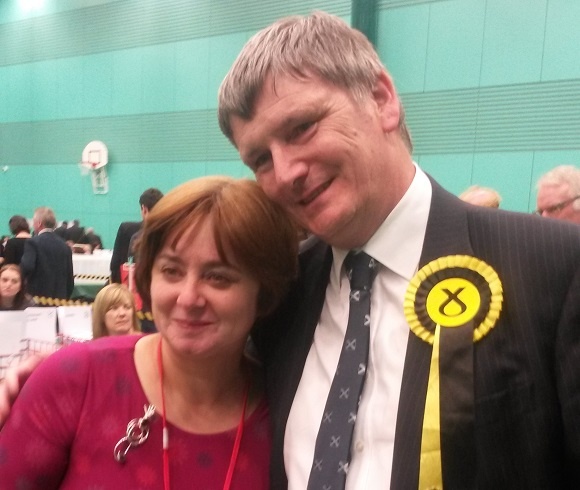
The SNP gain Glenrothes in "one of the biggest upsets in Scottish political history" at the General Election.
Nationalist candidate Peter Grant, the opposition leader on Fife Council, enjoyed a majority larger than his nearest challenger managed in total votes. He told us he had heard before polls opened that senior Labour members in the area had switched to the Scottish National Party.
Melanie Ward, defending a majority of 16,448 won by Lindsay Roy in 2010,. The party has held the seat since the boundaries were changed in 2005. It was one of the safest constituencies in Scotland.
She received a round of applause from party members as she arrived in her now trademark red coat at 1:20am, but was not keen on conducting any interviews at the time, and then declined to speak to the press after her defeat.
Glenrothes and Central Fife was second to declare turnout in the Kingdom. More people in the area voted than they did five years ago, with the turnout rate of 63.8 percent an increase from 59.87 percent in 2010.
The Result:
Breakdown:
| Peter Grant | SNP | 28,459 |
| Melanie Ward | Scottish Labour | 14,562 |
| Alex Stewart-Clark | Scottish Conservatives | 3,685 |
| Jane-Ann Liston | Scottish Liberal Democrats | 892 |
| Turnout Votes |
63.8% 47,598 |
Who is Peter Grant?

Peter Grant is 54, married to a fellow SNP councillor, they have no children and have lived in Glenrothes for three decades.
This was his second time standing in the constituency, having lost to Lindsay Roy in a by-election in 2008.
Peter was originally a physics teacher before retraining as an accountant. He has a professional qualification in public sector finance and has been a Glenrothes Councillor since 1992.
He was leader of Fife Council for five years and is leader of the local SNP group.
Defeat for Melanie Ward

Melanie did not wish to speak to the press after the result, this was her concession speech:
Background - The Constituency
Former MP Lindsay Roy stepped down after seven years representing the area at Westminster, later revealing that he is battling Parkinson's disease.
The seat replaced Central Fife in 2005, and includes small parts of the Kirkcaldy and Dunfermline East constituencies. Labour have won both parliamentary elections in the 10 year history of the constituency.
The SNP won the equivalent seat during the 2011 Scottish elections, before Tricia Marwick became independent in order to become Presiding Officer at Holyrood.
A recent by-election swung the local council area committee from Labour to the SNP. The Liberal Democrats and Conservatives traditionally finish third and fourth.
Glenrothes was built in 1948, Scotland's second post-war town, to house miners from the Rothes Colliery. It's the administrative centre of Fife, with the local authority and Fife Division of Police Scotland based in the constituency.
The other major towns and villages here are Methil, Buckhaven and the Wemyss villages, as well as Markinch, Leslie, and Thornton
This area has some of the highest levels of deprivation in Scotland, with many communities among the 5% worst off in the country, and thousands of parents and children using foodbanks over the last two years.
The constituency is home to 22 primary schools and three secondaries.

 10°C
10°C
 10°C
10°C